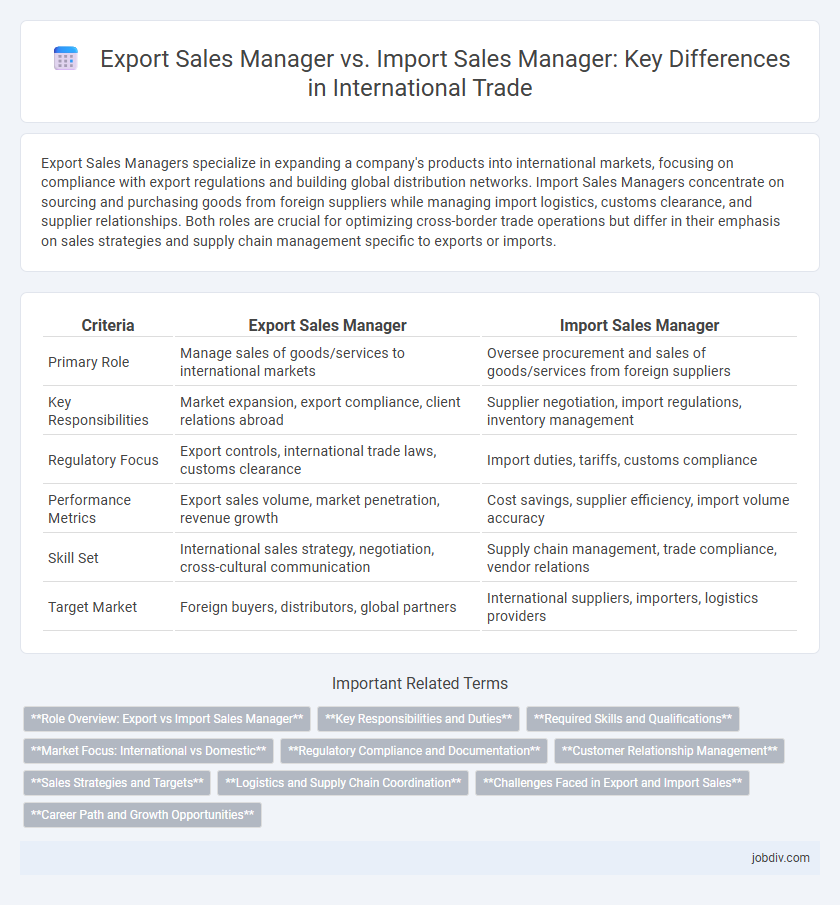Export Sales Managers specialize in expanding a company's products into international markets, focusing on compliance with export regulations and building global distribution networks. Import Sales Managers concentrate on sourcing and purchasing goods from foreign suppliers while managing import logistics, customs clearance, and supplier relationships. Both roles are crucial for optimizing cross-border trade operations but differ in their emphasis on sales strategies and supply chain management specific to exports or imports.
Table of Comparison
| Criteria | Export Sales Manager | Import Sales Manager |
|---|---|---|
| Primary Role | Manage sales of goods/services to international markets | Oversee procurement and sales of goods/services from foreign suppliers |
| Key Responsibilities | Market expansion, export compliance, client relations abroad | Supplier negotiation, import regulations, inventory management |
| Regulatory Focus | Export controls, international trade laws, customs clearance | Import duties, tariffs, customs compliance |
| Performance Metrics | Export sales volume, market penetration, revenue growth | Cost savings, supplier efficiency, import volume accuracy |
| Skill Set | International sales strategy, negotiation, cross-cultural communication | Supply chain management, trade compliance, vendor relations |
| Target Market | Foreign buyers, distributors, global partners | International suppliers, importers, logistics providers |
Role Overview: Export vs Import Sales Manager
Export Sales Managers specialize in managing international sales activities, developing strategies to enter and expand foreign markets, and ensuring compliance with export regulations and documentation. Import Sales Managers focus on sourcing products from global suppliers, negotiating purchase terms, managing customs clearance, and optimizing supply chain efficiency for inbound goods. Both roles require strong market analysis skills but differ in emphasis on outbound versus inbound logistics and regulatory frameworks.
Key Responsibilities and Duties
Export Sales Managers primarily oversee the international sales process, managing export documentation, negotiating with foreign buyers, and ensuring compliance with international trade regulations to expand market reach. Import Sales Managers focus on sourcing and procuring goods from overseas suppliers, coordinating logistics and customs clearance, and maintaining supplier relationships to optimize inventory and cost efficiency. Both roles require strong knowledge of global trade laws, supply chain management, and customer relationship management but differ in their focus on outbound versus inbound trade activities.
Required Skills and Qualifications
Export Sales Managers require expertise in international trade regulations, strong negotiation skills, and proficiency in foreign languages to manage cross-border transactions effectively. Import Sales Managers need deep knowledge of customs compliance, supply chain logistics, and vendor relationship management to ensure smooth procurement processes. Both roles demand analytical skills, experience with trade documentation, and the ability to coordinate with multiple stakeholders across different countries.
Market Focus: International vs Domestic
Export Sales Managers concentrate on international markets, developing strategies to promote products across diverse countries and navigating complex global regulations. Import Sales Managers focus on domestic markets by sourcing and securing products from foreign suppliers to meet local consumer demand and comply with national trade policies. Understanding the distinct market focus of export versus import roles ensures effective trade operations aligned with business objectives.
Regulatory Compliance and Documentation
Export Sales Managers specialize in navigating international trade regulations, ensuring all export documentation such as commercial invoices, export licenses, and certificates of origin comply with destination country laws and customs requirements. Import Sales Managers focus on aligning import activities with domestic regulations, managing necessary documentation like import permits, customs declarations, and compliance with product standards to prevent delays and penalties. Both roles require deep knowledge of trade compliance frameworks such as the International Chamber of Commerce's Incoterms and government agencies' import-export controls to facilitate smooth cross-border transactions.
Customer Relationship Management
Export Sales Managers excel in international Customer Relationship Management by adapting communication strategies to diverse cultural contexts, ensuring compliance with export regulations, and managing long-term partnerships across global markets. Import Sales Managers focus on building and maintaining relationships with domestic suppliers and foreign manufacturers, optimizing supply chain coordination, and negotiating terms to enhance customer satisfaction and reduce lead times. Both roles require advanced CRM systems to track client interactions, analyze sales data, and personalize service to drive customer loyalty and revenue growth.
Sales Strategies and Targets
Export Sales Managers develop strategies tailored to international markets by analyzing global demand, navigating trade regulations, and targeting overseas distributors or retailers to increase product penetration and revenue. Import Sales Managers focus on sourcing competitive products from foreign suppliers, negotiating terms, and aligning sales targets with domestic market needs to optimize inventory and satisfy local customer demand. Both roles require setting measurable sales targets, leveraging market intelligence, and coordinating with logistics and marketing teams to drive efficient cross-border trade operations.
Logistics and Supply Chain Coordination
An Export Sales Manager specializes in coordinating outbound logistics, ensuring timely shipment, customs compliance, and efficient delivery to international markets. In contrast, an Import Sales Manager focuses on managing inbound logistics, including supplier coordination, customs clearance, and inventory management to maintain seamless supply chain flow. Both roles require expertise in global trade regulations, transportation modes, and supplier relationships to optimize supply chain efficiency and reduce operational costs.
Challenges Faced in Export and Import Sales
Export Sales Managers face challenges such as navigating complex international regulations, managing currency fluctuations, and overcoming logistical hurdles across multiple countries. Import Sales Managers must handle customs compliance, negotiate with foreign suppliers, and address delays in supply chains caused by geopolitical issues. Both roles require expertise in risk management and strong coordination with global partners to ensure smooth cross-border transactions.
Career Path and Growth Opportunities
Export Sales Managers often progress by expanding their expertise in international markets, developing skills in global logistics, and navigating export regulations, which can lead to senior roles such as Director of International Sales or Global Trade Manager. Import Sales Managers build their career by mastering supply chain management, customs compliance, and vendor negotiations, positioning themselves for advancement to roles like Import Operations Director or Head of Procurement. Both paths offer growth through cross-functional collaboration and specialization in trade compliance, with opportunities to influence global business strategies.
Export Sales Manager vs Import Sales Manager Infographic

 jobdiv.com
jobdiv.com